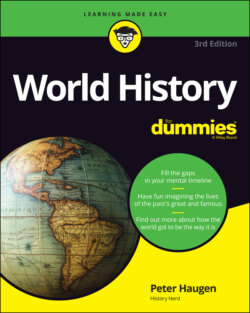Читать книгу World History For Dummies - Peter Haugen - Страница 38
Talking like no one had before
ОглавлениеBefore creating counting devices and pictures on rocks, human beings accomplished a more remarkable feat: They talked. Other species communicate with noises, and some (birds and certain monkeys, for example) have complex vocabularies. But no other creature has anything as versatile or expressive as human language.
Scientists don’t know when language happened. No one can tell whether the first anatomically modern humans were able to make all the sounds that their descendants do, because soft tissues such as the tongue and larynx rot away, even when bones fossilize. We don’t know how well, or even whether, Neanderthals and Denovisans talked. It seems likely that they did. Yet whenever it came about, nuanced language brought huge change. As people gave specific meanings to combinations of vocal sounds, they were devising sound symbols. As with some other species, a noise stood for a thing, an action, or an emotion. But humans got fancy with their noisemaking. They went beyond warning about predators and calling the children to dinner and progressed to sharing more complicated information.
People began to amass knowledge— not just as individuals, but as societies. They could always learn by watching and doing; now they could also understand by being told. The how-to genre was born.
Through language, early humans benefited from the experiences of tribe members who were no longer living. After tribes built lore (a body of shared knowledge), they could embellish it, spinning hunting stories that did more than help successive generations find and kill large prey, for example. Within several generations, tribes surely had more fanciful folktales about ancestors, heroes, creation, spirits, and gods who commanded the stars and the Earth. After writing developed, it was possible for cultures to leave a permanent record of events.
Herodotus the Greek, credited as the father of history, took his subject to the level of intellectual inquiry in the fifth century BC as he gathered 1,000-year-old stories from around the Mediterranean. As the body of oral and written history grew, there came a need to organize it.
